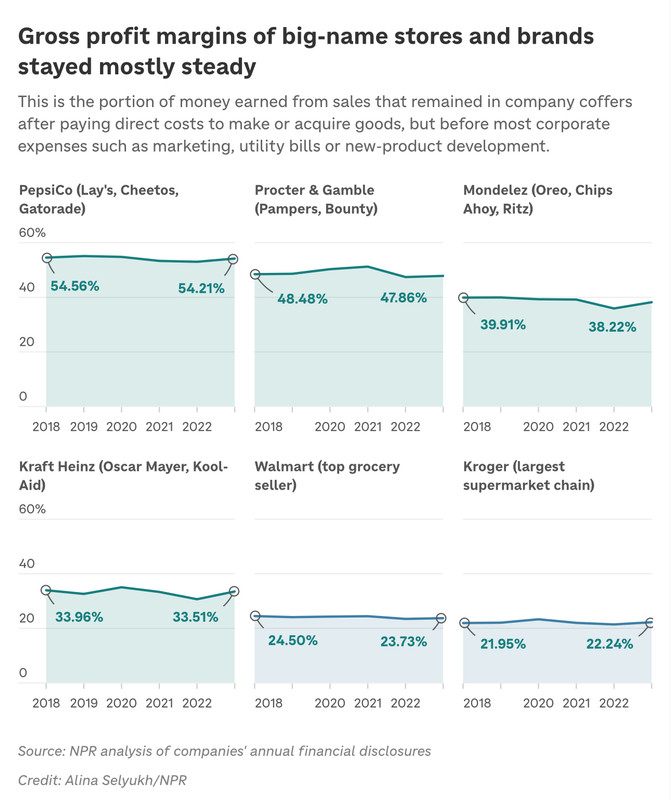
Posted on 09/10/2024 5:34:25 PM PDT by NoLibZone
Are greedy corporations to blame for inflation?
Ariane Navarro thinks so. She recently pulled up her budgeting spreadsheets from 2021 and was shocked by how much her family's grocery bill has skyrocketed.
She's not imagining it: From February 2020 to this July, grocery prices grew a cumulative 25.6%. That's higher than overall inflation, which was 21.6% during that same period.
"We have no other choice — we have to buy groceries," says Navarro, who lives in Houston. "That's a basic need. And so [companies] use that to kind of take advantage and keep raising prices."
It's a widespread sentiment — and a popular political refrain ahead of the presidential election, as Vice President Harris pledges to crack down on "price gouging" on Day 1.
It doesn't help that corporate executives have spent recent years touting their pricing power on calls with investors, like when the CEO of Cottonelle-maker Kimberly-Clark, Mike Hsu, said last year: "If the price goes up on bath tissue, generally doesn't mean you're going to use the bathroom less." Many makers and sellers of home and pantry staples have reported record profits.
But just how much is this driving supermarket inflation? Data tells a messier story.
Costs have jumped for grocers and food manufacturers
There's no dispute that food sellers and manufacturers have passed costs on to consumers; they typically do, to varying degrees. And their costs increased substantially from the start of the coronavirus pandemic.
First came the crush of shoppers stockpiling groceries to prepare for lockdowns, right as operations slowed at meatpacking plants and transportation companies. Shipping bills skyrocketed. Workers fell ill; firms shelled out money for acrylic shields at cash registers and for other anti-coronavirus measures. Prices surged for commodities, such as wood pulp for diapers.
Later, Russia's invasion of Ukraine disrupted global food supplies, particularly grains, vegetable oil and fertilizer. Avian flu, floods and droughts led to spikes in the prices for eggs, oranges and chocolate.
Through it all, an exodus of workers from lower-paying jobs led companies to push up wages that had been stuck for decades.
Researchers at two Federal Reserve Banks — those based in Kansas City and New York — say this is a key driver of higher grocery prices. Pay for workers in food manufacturing and retail rose a bit faster than pay for workers in many other occupations. A report from the Federal Reserve Bank of Kansas City noted that processed food, which requires more labor, accounted for the vast majority of price hikes.
Looking at companies' sales and expenses
Still, most shoppers wonder how far companies reach past costs to boost profits. This is where it gets technical fast, leading to nuanced takes by economists.
One specific allegation of pricing overreach came to light in an ongoing court hearing that disclosed an email by a Kroger executive. In March, he wrote that the supermarket chain's milk and egg prices were "significantly higher" than was necessary to account for inflation. Kroger later said the email was "cherry-picked" from "a specific period" that didn't reflect its pricing approach.
NPR crunched financial disclosures by a dozen of the largest grocery-item makers and sellers, including Walmart, Pepsi, Oreo-maker Mondelez and Procter & Gamble, which makes Pampers and Bounty.
The idea was to track changes not in the sheer dollar amount, which rides the waves of our shopping sprees, but in the percentage of money that stays in corporate coffers after a sale. Economists and accountants use different metrics for this. The gross profit margin is one of them — the portion that companies keep after paying just the direct costs to make or stock their goods.
Companies' financial disclosures cover global operations, meaning lots of variety in costs and prices. But for almost all companies that NPR analyzed, between 2018 and 2023 the margins either declined or grew less than 1%.

This company data doesn't offer a satisfying explanation for why families like Navarro's are finding their grocery budgets stretched by pricier meat and snacks.
So most economists look more broadly at U.S. retailers and food manufacturers for clues about the industry overall.
The matter of grocery markups
Several government data sources offer similar takeaways. Take the Census Bureau's report on corporations, which tracks total sales and most operating costs. At food manufacturers, it shows profit margins climbing and falling dramatically during the pandemic before settling near pre-pandemic levels at the start of this year.
Sachin Shivaram, CEO of Wisconsin Aluminum Foundry in Manitowoc, Wisc., realized during the pandemic how much his employees were struggling with child care. Figuring out how to help them has been challenging. BUSINESS This boss vowed to help his workers with child care. It hasn't been easy Supermarkets, liquor stores and convenience stores are much less profitable businesses overall. Their profit margins climbed more gradually in recent years but got sticky at the top, meaning companies kept a slightly bigger share of the money from sales as time went on, and they've been slower to give up those gains.
Yet that's not quite the smoking gun to explain grocery inflation, according to New York Federal Reserve researcher Thomas Klitgaard.
"Even though profit margins for grocery stores have gone up," he wrote in a July report, "the increase appears to be only a small contributor to the rise in food prices relative to the increase in their operating costs."
Economist Ernie Tedeschi has sliced this data another way to draw a contrast between grocers and other types of retailers. Until March, Tedeschi was the chief economist at the White House Council of Economic Advisers. He wanted to track how much grocers' income has outpaced increases in their costs — what he calls a markup above costs.
Markups at grocery stores were slower to grow, slower to decline In early 2024, grocery retailers' income outpaced costs by 6.8% versus 7.5% at other types of retailers. That gap has narrowed in recent years. This can indicate higher markups on grocery prices, though reasons might include sales of more profitable items such as store-brand goods.

"Grocery was different" from the rest of retail, Tedeschi said. "Grocery didn't pop as quickly in the depths of the pandemic, but it rose sort of like a slow burn and it stayed tenaciously higher."
What does this actually mean about inflation?
The Biden administration has been eager to blame corporate greed. But even a report that the White House put out this year acknowledged that store markups don't fully explain food inflation.
"It's very difficult to tease out what's going on," said Tedeschi, who's now at the Budget Lab at Yale University. "It's not — I want to emphasize — dispositive proof that there is anything anti-competitive going on. That is one explanation, but there are lots of other explanations."
One of them could be shoppers buying more private-label groceries, he said. These store-brand products are usually cheaper than brand-name ones but are much more profitable for the retailer. Data firm Circana found U.S. shoppers spent 6% more on private-label items in 2023 than in 2019.
Then there's the fact that people have been spending big on groceries, even as they shop less at other stores. And that's on top of an unprecedented surge in spending in recent years — first as people received pandemic relief checks and then as wages grew in many jobs.
"If supply is fixed and the buyers suddenly have more money, then prices are going to rise — and that's kind of what happened," said Ian Shepherdson, chief economist at Pantheon Macroeconomics. "There genuinely was an increase in costs, but then there was this extra margin on top. So the question is, how on earth did [retailers] manage to get away with that? That to me is the big issue."
Only this year did brands including Pepsi and Nestlé begin noting pushback from shoppers. Walmart and Target have started promoting discounts and lower prices. The cost of ingredients and shipping has eased; wage growth has cooled. And so, many grocery prices have been declining, including those for cereal, cheese and fruit.
Economists and accountants differ on how to measure markups, but most agree that they have begun eroding. Navarro and many other shoppers hope this means prices stop rising, at least for a while.
NPR's Scott Horsley contributed to this report.
"NPR says it's not corporate greed but inflation remains a complete mystery."
Complete bilge. Why do my tax dollars subsidize this propaganda?
Milton Friedman has a theory about inflation. https://www.youtube.com/watch?v=F94jGTWNWsA
Dagnabbit! You beat me by 17 seconds.
I’m 80 years old. Never in my lifetime has there been a baby formula shortage...until Brandon took over.
Female “Hispanic” Marxist economic analysis?
So Kroger makes 25% on its sales? This is before “marketing, UTILITY COSTS, and research.
What BS. I’m sure it’s before wages, building costs and taxes, too. Most groceries have 1-4% profit.
Eggs $3.74/dozen at Aldi.
At one time under Trump they were $1.07/dozen.
Biden’s neck should be 3.5 times higher.
The consumers are the ones driving up grocery prices. If people would just stop eating prices would drop to near nothing.
Seriously, this is NPR. Just about anything they say is a lie. If Trump does clean house, I hope this commie outfit goes down the drain. With all the broadcasting companies out there, there is simply no need for it at all.
Walmart Saltines
I remember $1.12 under Biden.
I saw $1.74 today.
I haven’t bought beef for months.
I did buy some foreign hamburger at Aldi’s back then and it was quite good.
Long ago NPR saved their morning Marxism for the last 15 minutes of a two-hour program.
Nowadays, I totally avoid NPR.
Bidenflation 25.6% (since Joe was installed)
Social Security COLA this year estimated 2.54%
Thanks, Democrat Joe Biden
If any senior (or any other person who buys food and wants to EAT) votes Democrat, they’re terminally-stupid. /Captain Obvious
If they’re greedy now, why weren’t they greedy before?
[From February 2020]
Oh, Fauci’s Engineered COVID-19(84) too
Things were shutting down in my area, significantly, early in March 2020.
Money supply? M2 has declined by $2 trillion in the past 24 months, from $45 trillion to $43 trillion. It’s mostly due to the Fed destroying money by selling securities.
Actually, in my lifetime inflation has been mainly an oil price phenomenon.
Lots of money for Covid handouts simply led to empty Walmart shelves.
Aldi and Walmart stock once a day generally. Aldi generally restocks completely every morning. Walmart has lots of restocking failures.
Disclaimer: Opinions posted on Free Republic are those of the individual posters and do not necessarily represent the opinion of Free Republic or its management. All materials posted herein are protected by copyright law and the exemption for fair use of copyrighted works.